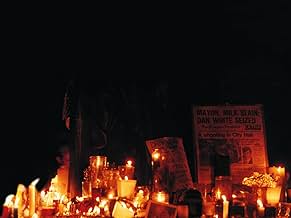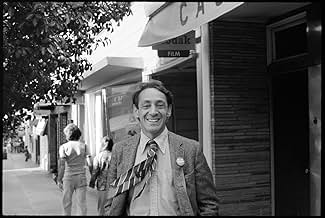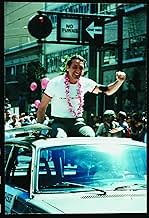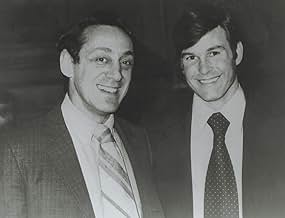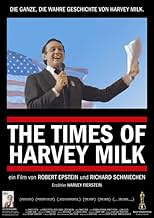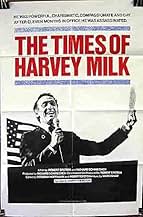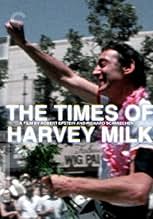AVALIAÇÃO DA IMDb
8,2/10
6,9 mil
SUA AVALIAÇÃO
Um documentário sobre a carreira bem-sucedida e o assassinato do primeiro supervisor gay eleito da cidade de São Francisco.Um documentário sobre a carreira bem-sucedida e o assassinato do primeiro supervisor gay eleito da cidade de São Francisco.Um documentário sobre a carreira bem-sucedida e o assassinato do primeiro supervisor gay eleito da cidade de São Francisco.
- Direção
- Roteiristas
- Artistas
- Ganhou 1 Oscar
- 11 vitórias e 2 indicações no total
Harvey Fierstein
- Narrator
- (narração)
Harvey Milk
- Self
- (cenas de arquivo)
John Briggs
- Self
- (cenas de arquivo)
Jerry Brown
- Self
- (cenas de arquivo)
Jimmy Carter
- Self
- (cenas de arquivo)
Dianne Feinstein
- Self
- (cenas de arquivo)
- (as Mayor Dianne Feinstein)
David Fowler
- Self - TV Interviewer of Dan White
- (cenas de arquivo)
Joseph Freitas
- Self
- (cenas de arquivo)
Terence Hallinan
- Self
- (cenas de arquivo)
George Moscone
- Self
- (cenas de arquivo)
- Direção
- Roteiristas
- Elenco e equipe completos
- Produção, bilheteria e muito mais no IMDbPro
Avaliações em destaque
The life and aftermath in death of wonderfully wry and droll Harvey Milk, San Francisco's first openly gay city official who, along with Mayor George Moscone, was killed on a November day in 1978 by disgruntled ex-colleague Dan White (who ultimately received an unusually light sentence after his trial). From Milk's sneaky campaigning tricks to the infamous 'Twinkie Defense', this documentary is solid and involving. It has a creepy ambiance that is difficult to shake after it's over, yet there's a darkly amusing undercurrent throughout (which Milk himself might've appreciated!). The film says to take these events seriously, but to take them AS events. See the humor in the chaos. This was a deserved Oscar winner for Best Documentary Feature; it is quite moving, funny, despairing--never clinical or cold. *** from ****
I caught this on IFC a few weeks back. I've had the original Mark Isham score for years, and love that, but I never put any effort into finding and watching the film. It's wonderful. Even listening to Harvey Fierstein's voiceover doesn't get irritating because the subject matter is at once riveting and heartfelt, exuberant and crushing. The thing that makes this movie so effective, I think, is that it was clearly pieced together for a mixed audience. This is not a gay film, or a political film, or something only San Franciscans will understand. It brings you in and allows you to really see and hear how this man affected lives around him, including the life of the man who shot him. Fascinating. Haunting. Wonderful. Go see this film.
Though I am a San Francisco Bay Area native, I have no memory of Harvey Milk's career, being as I was only 6 when he was assassinated. However, watching this film made me feel as if I was there, seeing everything as it happened. It truly is that powerful and involving.
Director Robert Epstein skillfully alternate between archival news footage and interviews with Milk's friends and associates, who recall him with warmth and affection. This isn't a hagiography (Milk was, as his former campaign manager notes, hot-tempered and sometimes very hard to work with), it's merely a straightforward portrait of a fascinating and inspirational man.
Harvey Milk was charming, intelligent, articulate, and above all, tenacious. It was largely due to his efforts and those of his supporters that the Briggs Initiative, which would've restricted the rights of gay teachers, was defeated in California. Though gay rights were understandably his biggest issue, he also fought for other disenfranchised groups, and shrewdly recognized that they should all come together as one to fight for human rights. He also presciently recognized the very real possibility that he could be murdered, and taped a statement which he requested be played only in the event of his death by assassination. It's eerie to listen to it, not least because he speaks in such a matter-of-fact way.
Epstein provides a surprising amount of balance with regards to Dan White, who shot both Milk and George Moscone. He certainly doesn't have sympathy with White's actions, but he makes sure to note that White had devoted his whole life to public service, that he gave up a secure job as a fireman to take a low-paying job as district supervisor, then quit in frustration. Nonetheless, his disgust for the ridiculously light sentence White received for murdering Milk and Moscone is palpable, and one interviewee posits that had White murdered only Moscone, he'd have been in San Quentin for the rest of his life.
White, by the way, committed suicide a year after being released from prison. Epstein thought about changing the ending of the film in order to mention this fact, but decided that to do so would be to shift the focus too much to White. The subject of this movie is Harvey Milk, and it's a beautiful tribute to him.
I do have one criticism: the filmmakers don't clear up the matter of the so-called "Twinkie defense," in which psychiatrists who testified for Dan White's defense allegedly claimed that his consumption of junk food was what caused his depression (which, his attorneys argued, was what led him to go on his killing rampage). What the psychiatrists actually claimed was that White consumption of junk food was a symptom, not the cause, of his depression.
Director Robert Epstein skillfully alternate between archival news footage and interviews with Milk's friends and associates, who recall him with warmth and affection. This isn't a hagiography (Milk was, as his former campaign manager notes, hot-tempered and sometimes very hard to work with), it's merely a straightforward portrait of a fascinating and inspirational man.
Harvey Milk was charming, intelligent, articulate, and above all, tenacious. It was largely due to his efforts and those of his supporters that the Briggs Initiative, which would've restricted the rights of gay teachers, was defeated in California. Though gay rights were understandably his biggest issue, he also fought for other disenfranchised groups, and shrewdly recognized that they should all come together as one to fight for human rights. He also presciently recognized the very real possibility that he could be murdered, and taped a statement which he requested be played only in the event of his death by assassination. It's eerie to listen to it, not least because he speaks in such a matter-of-fact way.
Epstein provides a surprising amount of balance with regards to Dan White, who shot both Milk and George Moscone. He certainly doesn't have sympathy with White's actions, but he makes sure to note that White had devoted his whole life to public service, that he gave up a secure job as a fireman to take a low-paying job as district supervisor, then quit in frustration. Nonetheless, his disgust for the ridiculously light sentence White received for murdering Milk and Moscone is palpable, and one interviewee posits that had White murdered only Moscone, he'd have been in San Quentin for the rest of his life.
White, by the way, committed suicide a year after being released from prison. Epstein thought about changing the ending of the film in order to mention this fact, but decided that to do so would be to shift the focus too much to White. The subject of this movie is Harvey Milk, and it's a beautiful tribute to him.
I do have one criticism: the filmmakers don't clear up the matter of the so-called "Twinkie defense," in which psychiatrists who testified for Dan White's defense allegedly claimed that his consumption of junk food was what caused his depression (which, his attorneys argued, was what led him to go on his killing rampage). What the psychiatrists actually claimed was that White consumption of junk food was a symptom, not the cause, of his depression.
10PDWadler
This is a very important film, documenting the coming-of-age of LGBT involvement in the political process. Made just a few years after the Milk/ Moscone assassinations, it expertly captures the mood of a community, pre-AIDS, poised to assume political power.
The climax of the film is the peaceful, strangely silent, candle-lit march up Market Street from the Castro, the center of San Francisco's gay male community. The gay community's response to horrific violence is shock and love. When I show this film to young (mostly heterosexual) student audiences, there is always a collective gasp as they see the throngs of silent marchers.
The climax of the film is the peaceful, strangely silent, candle-lit march up Market Street from the Castro, the center of San Francisco's gay male community. The gay community's response to horrific violence is shock and love. When I show this film to young (mostly heterosexual) student audiences, there is always a collective gasp as they see the throngs of silent marchers.
10Ozdachs
I felt it was a powerful film as I saw it as a new arrival in SF in 1984. I didn't understand its power, though, until the documentary ended and the theather kept the lights very low. As I got up and started walking to the exit, I realized that most of the audience kept their seats. Very odd, since the credits and EVERYTHING had ended. The folks were just sitting and crying.
Art has historically been used to let people rethink and understand the events of their times. (Think Shakespeare.) This film is that type of "art".
Art has historically been used to let people rethink and understand the events of their times. (Think Shakespeare.) This film is that type of "art".
Você sabia?
- CuriosidadesSelected for preservation by the National Film Registry in 2012.
- Erros de gravaçãoWhen describing Harvey Milk's murder, the narrator states that Dan White killed Milk in Milk's own office. In reality, White asked Milk to come into White's former office, closed the door, blocked it with his body, and shot Milk.
- Citações
[last lines]
Harvey Milk: I know that you cannot live on hope alone, but without it, life is not worth living. And You... And You... And You... Gotta give em hope. Thank You very much.
- Trilhas sonorasYou Make Me Feel (Mighty Real)
Performed by Sylvester
Written by Sylvester & James Wirrick (as Tip Wirrick)
Tim McKenna (Borozi Music Artists)
Fantasy Records
(c) 1978 Rights Donated
Principais escolhas
Faça login para avaliar e ver a lista de recomendações personalizadas
- How long is The Times of Harvey Milk?Fornecido pela Alexa
Detalhes
- Data de lançamento
- País de origem
- Central de atendimento oficial
- Idioma
- Também conhecido como
- Wer war Harvey Milk?
- Locações de filme
- Empresas de produção
- Consulte mais créditos da empresa na IMDbPro
Bilheteria
- Faturamento bruto nos EUA e Canadá
- US$ 13.801
- Fim de semana de estreia nos EUA e Canadá
- US$ 2.213
- 17 de set. de 2000
- Faturamento bruto mundial
- US$ 46.573
Contribua para esta página
Sugerir uma alteração ou adicionar conteúdo ausente

Principal brecha
By what name was The Times of Harvey Milk (1984) officially released in India in English?
Responda

